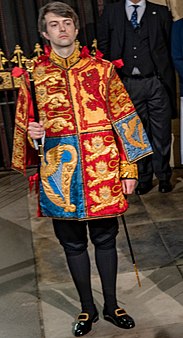The British royal family comprises King Charles III and his close relations. Charles is the head of the House of Windsor. There is no strict legal or formal definition of who is or is not a member, although the Royal Household has issued different lists outlining who is a part of the royal family. Members often support the monarch in undertaking public engagements, and pursue charitable work and interests. The royal family are regarded as British and world cultural icons.

The monarchy of the United Kingdom, commonly referred to as the British monarchy, is the constitutional form of government by which a hereditary sovereign reigns as the head of state of the United Kingdom, the Crown Dependencies and the British Overseas Territories. The current monarch is King Charles III, who ascended the throne on 8 September 2022, upon the death of his mother, Queen Elizabeth II.
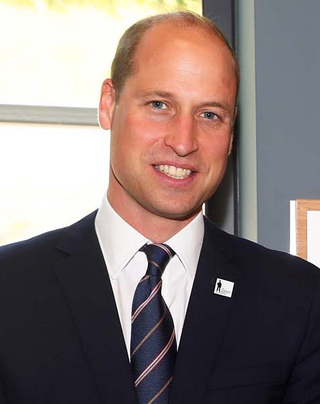
William, Prince of Wales, is the heir apparent to the British throne. He is the elder son of King Charles III and Diana, Princess of Wales.

Charles III is King of the United Kingdom and the 14 other Commonwealth realms.

A speech from the throne, or throne speech, is an event in certain monarchies in which the reigning sovereign, or their representative, reads a prepared speech to members of the nation's legislature when a session is opened, or in some cases closed. The address sets forth the government's priorities for its legislative agenda, for which the cooperation of the legislature is sought. The speech is often accompanied by formal ceremony. It is often held annually, although in some places it may occur more or less frequently, whenever a new session of the legislature is opened.
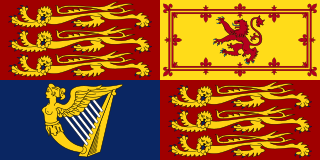
The Royal Standards of the United Kingdom presently refer to either of two similar flags used by King Charles III in his capacity as Sovereign of the United Kingdom, the Crown dependencies, and the British Overseas Territories. Two versions of the flag exist, one for use within Scotland and the other for use elsewhere.

The State Opening of Parliament is a ceremonial event which formally marks the beginning of a session of the Parliament of the United Kingdom. It includes a speech from the throne known as the King's Speech. The event takes place in the House of Lords chamber on the first day of a new session, which is usually in May or June, and traditionally in November, but can occur at any time of year depending on the timing of General Elections and parliamentary session start dates. It takes place in front of both Houses of Parliament. The monarch, wearing the Imperial State Crown, reads a speech that has been prepared by his or her government outlining its plans for that parliamentary year. The most recent ceremony was held on 10 May 2022.

Counsellors of State are senior members of the British royal family to whom the monarch can delegate and revoke royal functions through letters patent under the Great Seal, to prevent delay or difficulty in the dispatch of public business in the case of their illness or of their intended or actual absence from the United Kingdom.
The Regency Acts are Acts of the Parliament of the United Kingdom passed at various times, to provide a regent in the event of the reigning monarch being incapacitated or a minor. Prior to 1937, Regency Acts were passed only when necessary to deal with a specific situation. In 1937, the Regency Act 1937 made general provision for a regent, and established the office of Counsellor of State, a number of whom would act on the monarch's behalf when the monarch was temporarily absent from the realm or experiencing an illness that did not amount to legal incapacity. This Act, as modified by the Regency Acts of 1943 and 1953, forms the main law relating to regency in the United Kingdom today.

The monarchy of Solomon Islands is a system of government in which a hereditary monarch is the sovereign and head of state of Solomon Islands. The current monarch and head of state since 8 September 2022, is King Charles III. As sovereign, he is the personal embodiment of the Crown of Solomon Islands. Although the person of the sovereign is equally shared with 14 other independent countries within the Commonwealth of Nations, each country's monarchy is separate and legally distinct. As a result, the current monarch is officially titled King of Solomon Islands and, in this capacity, he and other members of the royal family undertake public and private functions domestically and abroad as representatives of Solomon Islands. However, the King is the only member of the royal family with any constitutional role.

The monarchy of Antigua and Barbuda is a system of government in which a hereditary monarch is the sovereign and head of state of Antigua and Barbuda. The current Antiguan and Barbudan monarch and head of state, since 8 September 2022, is King Charles III. As sovereign, he is the personal embodiment of the Crown of Antigua and Barbuda. Although the person of the sovereign is equally shared with 14 other independent countries within the Commonwealth of Nations, each country's monarchy is separate and legally distinct. As a result, the current monarch is officially titled King of Antigua and Barbuda and, in this capacity, he and other members of the Royal Family undertake public and private functions domestically and abroad as representatives of Antigua and Barbuda. However, the King is the only member of the Royal Family with any constitutional role.

The monarchy of Barbados was a system of government in which a hereditary monarch was the sovereign and head of state of Barbados from 1966 to 2021. Barbados shared the sovereign with the other Commonwealth realms, with the country's monarchy being separate and legally distinct. The monarch's operational and ceremonial duties were mostly delegated to her representative, the governor-general of Barbados.
In the UK and certain other Commonwealth countries, King's Consent is a parliamentary convention under which Crown consent is sought whenever a proposed parliamentary bill will affect the Crown's own prerogatives or interests. Prince's Consent is a similar doctrine, under which consent of the Prince of Wales must be obtained for matters relating to the Duchy of Cornwall. King's or Prince's Consent must be obtained early in the legislative process, generally before parliament may debate or vote on a bill. In modern times, following the tenets of constitutional monarchy, consent is granted or withheld as advised by government.

Monarchy: The Royal Family at Work is a fly on the wall documentary TV series made by the BBC and RDF Media which follows the British Royal Family over the course of a year.
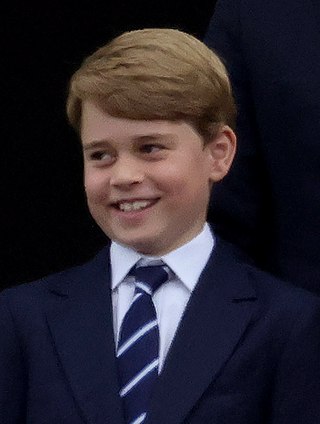
Prince George of Wales is a member of the British royal family. He is the eldest child of William, Prince of Wales and Catherine, Princess of Wales. George is the eldest grandchild of King Charles III and is second in the line of succession to the British throne behind his father.

Prince Louis of Wales is a member of the British royal family. He is the third and youngest child of William, Prince of Wales, and Catherine, Princess of Wales. A grandson of King Charles III, he is fourth in the line of succession to the British throne.

A State Opening of Parliament took place on 11 May 2021. Queen Elizabeth II opened the second session of the 58th Parliament with the traditional Queen's Speech. The event was significant as it involved many restrictions due to the COVID-19 pandemic in the United Kingdom.
Royal tours of Jamaica by the Jamaican Royal Family have been taking place since the 20th century. Elizabeth II, Queen of Jamaica, visited the island six times; in 1953, 1966, 1975, 1983, 1994, and 2002.
Royal tours of Antigua and Barbuda by its royal family have been taking place since the 20th century. Elizabeth II, Queen of Antigua and Barbuda, visited the country thrice: 1966, 1977, and 1985.
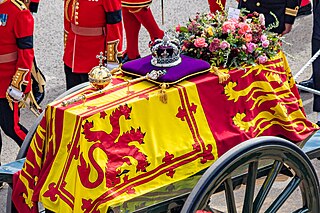
On 8 September 2022, at 15:10 BST, Elizabeth II, Queen of the United Kingdom and the other Commonwealth realms, died at Balmoral Castle in Scotland, at the age of 96. Elizabeth's reign was the longest of any British monarch. She was succeeded by her eldest son, Charles.

